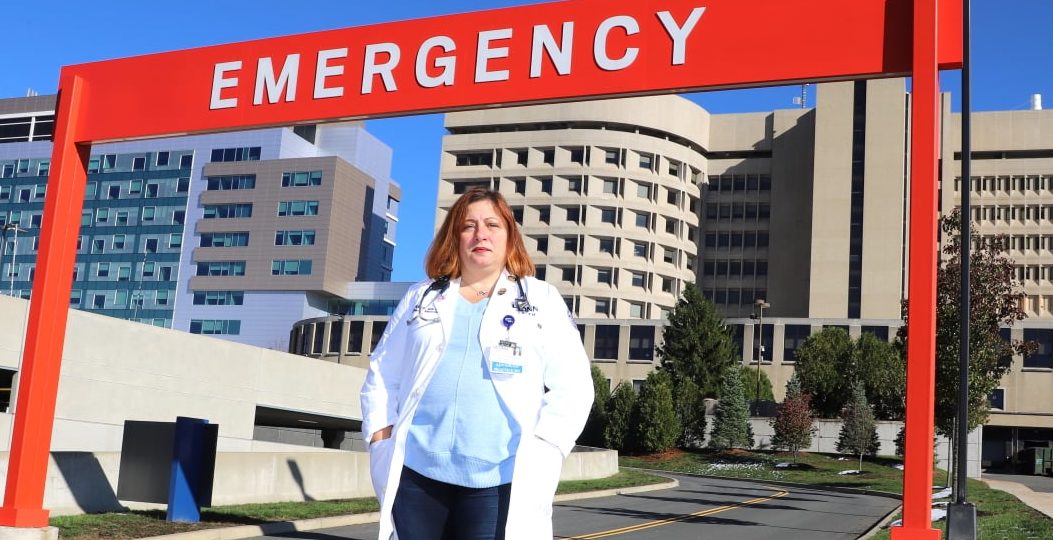ESSENTIAL WORKER PATRICIA LUCAS-ALMEIDA
Born in Portugal, she is a nurse at University Hospital in Connecticut
Patricia Lucas-Almeida received an education from the New University of Medical Sciences of Lisbon and obtained two degrees in health in the United States. The Portuguese advanced registered nurse is today assigned to the prestigious UCONN Health; the modern medicall center, located in Farmington. This institution is an extension of the University of Connecticut that includes an educational complex, the UCONN John Dempsey Hospital, the UCONN School of Medicine, the School of Dental Medicine and an advanced center of biomedical and bioscience investigation and research named ‘Bioscience Connecticut’.
“I love what I do,” states the nurse, in an interview with the newspaper LUSO-AMERICANO. “My parents immigrated with a 4th grade education ; Completing higher education is obviously very significant to me, but above all to them.”
Patricia’s life trajectory is an indecisive journey between the country she carries in her DNA and the one that fate has put in her way. She was born in Amiais de Baixo, Santarém, 45 years ago, and was 23 months old when in 1977 her parents crossed the Atlantic and chose to live in Hartford. At the age of 8, the family moved to West Hartford, where Patricia finished high school and then returned to Portugal to attend the New University of Middle Sciences in Lisbon. After her wedding, she immigrated again in 2000. “We said that, in terms of the future, we had more opportunities here, both for ourselves and for the family we planned to create,” she explains.
So at the age of 25 and without finishing the university in Portugal, she opted for two degrees in health, one Bachelor’s Degree in Biology and the other in Nursing, both obtained at St. Joseph College in West Hartford.
She began her career as a technician at St. Francis Hospital of Hartford, where she practiced for 12 years, first in the X-ray archives and later as a laboratory technician. She obtained a degree in nursing while working she transitioned to a sector, linked to a cardiac unit in the postoperative wing. Nine years ago, she moved to UCONN Health, where she did night shifts as a nurse specialize in providing general health care at the critical level.
The COVID epidemic is now part of her experience as a professional. Lucas Almeida relives the horrors of the peak of the new coronavirus: when she spent three months between a hotel and the basement of her house in order to not expose her family with whom she only communicated via FaceTime. “Knowing that we are now seeing a possible return of this situation is something that worries us all,” she says.
The fight against COVID was a long and difficult learning process for health professionals. “We had to learn how to deal with it as things were developing,” tells the nurse. “I remember, on the same day, we had to change the intervention protocols more than once, because we were learning from practice. It was all new and unknown.”
Several months ago, Patricia Lucas Almeida was transferred to a COVID infirmary, where she lived closely with the effects of the epidemic. “I remember taking care of a lady who was already intubated and whom we could do nothing else to save her life. She chose, in full awareness of her mental abilities, not to receive more treatment; the only thing she asked for was to see her daughter before she died. I took my personal phone and put them both on FaceTime for a few minutes; that’s how they said goodbye. She died two days later. There are many stories like these: where patients die without the family nearby, without being able to say goodbye to their loved ones, without being able to receive visits and we were completely powerless, without being able to change the state of conditions – except to give the care we could and comfort them. When we left the sick and retired in their rooms and returned to our areas we choked to gain strength and continue fighting, because our profession is made up of moments like these.”
When I hear that COVID is nothing more than a scam, a “disgusting” feeling overwhelms me. “We feel all this on the skin and, for me, it is a public health issue that implies that we all have responsibilities. The use of the mask is more to protect others and thus protect myself’.


